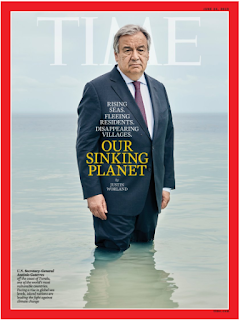Time Magazine recently put the current UN Secretary General on its cover promoting climate panic on the island nation of Tuvalu. So it MUST be true that these coral atoll nations are doomed. After all why would such an august figure as the Lord High Secretary General "dip trou" if it were not?
But I also know that these coral atolls are made of, you know, coral and that coral are living things and they grow. So in theory as the water level rises, the coral grows and the islands remain above sea level. I also know that a recent survey of Tuvalu published in Nature Communications* has found that their islands are in fact growing, not shrinking. So what gives? Is the sea level rising faster than the coral can grow? Could it? Had it done so in the past when we had far more ice to melt and temperatures rose much faster coming out of the last glaciation event?
So I went to our best, official source of historical and prehistorical sea level data at NASA GISS and found the page on past sea level trends. And this is what its first, summary paragraph said:
Climate warming is expected to result in rising sea level. Should this occur, coastal cities, ports, and wetlands would be threatened with more frequent flooding, increased beach erosion, and saltwater encroachment into coastal streams and aquifers. Global sea level has fluctuated widely in the recent geologic past. It stood 4-6 meters above the present during the last interglacial period, 125,000 years ago, but was 120 m lower at the peak of the last ice age, around 20,000 years ago. A study of past sea level fluctuations provides a longer-term geologic context, which can help us better anticipate future trends.
So first: Hang on a tick, what is this "Global sea level has fluctuated widely in the recent geologic past. It stood 4-6 meters above the present during the last interglacial period, 125,000 years ago"?
Yet we are told that global temperatures are at a "record high". Hmm. So back before man generated excess CO2 the climate was warm enough to melt 1.4 to 2.2 Trillion more Metric Tons of ice than is melted today? Really? And this in the "world class" experts' own published reports.
Another way to put it is: given the suspiciously precise current 'official' estimated 2.8mm of sea level rise per year, it would take between 1400 and 2100 years to equal the sea levels in the last interglacial - a span of time that separates us as far from that 'dystopian' future as Julius Caesar is from us. "Friends Romans, Countrymen, lend me your high tech windmills".
The second thing I learned is that according to best experts, the estimated peak prehistoric mean annual sea level rise rates at the end of the last glaciation were slower than the growth rates of many coral species. Meaning that even at rates over 5 times the current claimed "rapid" mean sea level rise, coral reefs could have "kept up" with rising seas. Which means there is no way that the many coral reef ringed islands are threatened with inundation. Indeed Coral experts use the metaphor that Coral atolls "float" on the surface of the ocean.
But when there's so much money to be made by pretending they sink.....
Which means the Secretary General is an ignoramus who ruined his pants for no reason (bet you he didn't even take off his Manolo Blahniks - expense account dontchaknow). But you already knew that.
Oh one more detail: Coral reefs are made of Calcium Carbonate which is fabricated by the Coral organisms from calcium and CO2 in the ocean. The more CO2, the more island. Just like the more CO2, the more plant life. But don't worry about that, I'm sure all that extra flora that it supports is just terrible.
And one more thing: if brainless coral polyps can outfox rising sea levels it would seem reasonable that sentient humans wielding 21st century technology could do so too.
And one more thing: if brainless coral polyps can outfox rising sea levels it would seem reasonable that sentient humans wielding 21st century technology could do so too.
*Specifically the studies of the Tuvalu island groups showed that:
“Here we present the first comprehensive national-scale analysis of the transformation in physical land resources of the Pacific atoll nation Tuvalu, situated in the central western Pacific (Supplementary Note 1). Comprising 9 atolls and 101 individual reef islands, the nation is home to 10,600 people, 50% of whom are located on the urban island of Fogafale, in Funafuti atoll28. We specifically examine spatial differences in island behaviour, of all 101 islands in Tuvalu, over the past four decades (1971–2014), a period in which local sea level has risen at twice the global average (Supplementary Note 2).Surprisingly, we show that all islands have changed and that the dominant mode of change has been island expansion, which has increased the land area of the nation. Results are used to project future landform availability and consider opportunities for a vastly more nuanced and creative set of adaptation pathways for atoll nations.”
*


